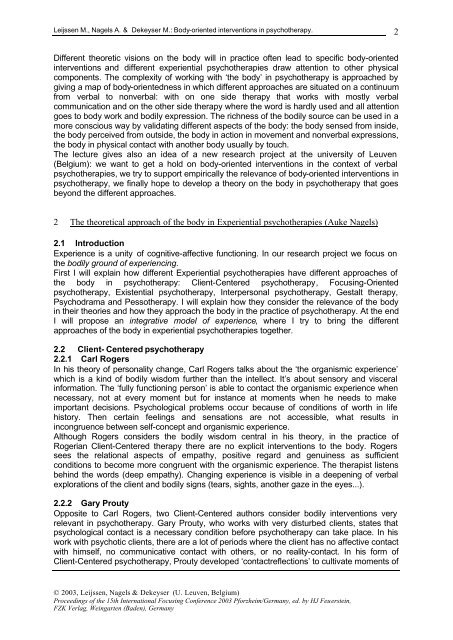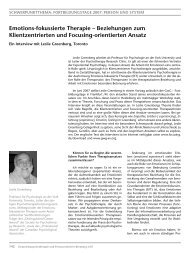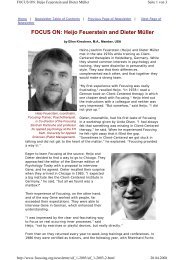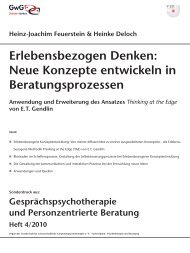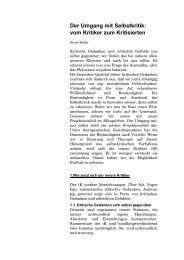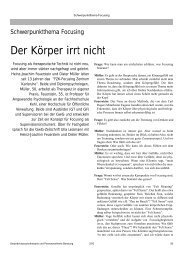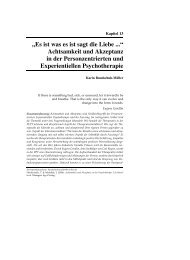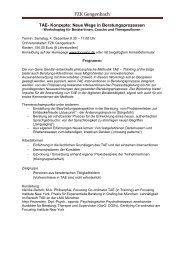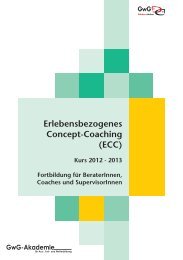Body-oriented interventions… - FOCUSING
Body-oriented interventions… - FOCUSING
Body-oriented interventions… - FOCUSING
You also want an ePaper? Increase the reach of your titles
YUMPU automatically turns print PDFs into web optimized ePapers that Google loves.
Leijssen M., Nagels A. & Dekeyser M.: <strong>Body</strong>-<strong>oriented</strong> interventions in psychotherapy.<br />
Different theoretic visions on the body will in practice often lead to specific body-<strong>oriented</strong><br />
interventions and different experiential psychotherapies draw attention to other physical<br />
components. The complexity of working with ‘the body’ in psychotherapy is approached by<br />
giving a map of body-<strong>oriented</strong>ness in which different approaches are situated on a continuum<br />
from verbal to nonverbal: with on one side therapy that works with mostly verbal<br />
communication and on the other side therapy where the word is hardly used and all attention<br />
goes to body work and bodily expression. The richness of the bodily source can be used in a<br />
more conscious way by validating different aspects of the body: the body sensed from inside,<br />
the body perceived from outside, the body in action in movement and nonverbal expressions,<br />
the body in physical contact with another body usually by touch.<br />
The lecture gives also an idea of a new research project at the university of Leuven<br />
(Belgium): we want to get a hold on body-<strong>oriented</strong> interventions in the context of verbal<br />
psychotherapies, we try to support empirically the relevance of body-<strong>oriented</strong> interventions in<br />
psychotherapy, we finally hope to develop a theory on the body in psychotherapy that goes<br />
beyond the different approaches.<br />
2 The theoretical approach of the body in Experiential psychotherapies (Auke Nagels)<br />
2.1 Introduction<br />
Experience is a unity of cognitive-affective functioning. In our research project we focus on<br />
the bodily ground of experiencing.<br />
First I will explain how different Experiential psychotherapies have different approaches of<br />
the body in psychotherapy: Client-Centered psychotherapy, Focusing-Oriented<br />
psychotherapy, Existential psychotherapy, Interpersonal psychotherapy, Gestalt therapy,<br />
Psychodrama and Pessotherapy. I will explain how they consider the relevance of the body<br />
in their theories and how they approach the body in the practice of psychotherapy. At the end<br />
I will propose an integrative model of experience, where I try to bring the different<br />
approaches of the body in experiential psychotherapies together.<br />
2.2 Client- Centered psychotherapy<br />
2.2.1 Carl Rogers<br />
In his theory of personality change, Carl Rogers talks about the ‘the organismic experience’<br />
which is a kind of bodily wisdom further than the intellect. It’s about sensory and visceral<br />
information. The ‘fully functioning person’ is able to contact the organismic experience when<br />
necessary, not at every moment but for instance at moments when he needs to make<br />
important decisions. Psychological problems occur because of conditions of worth in life<br />
history. Then certain feelings and sensations are not accessible, what results in<br />
incongruence between self-concept and organismic experience.<br />
Although Rogers considers the bodily wisdom central in his theory, in the practice of<br />
Rogerian Client-Centered therapy there are no explicit interventions to the body. Rogers<br />
sees the relational aspects of empathy, positive regard and genuiness as sufficient<br />
conditions to become more congruent with the organismic experience. The therapist listens<br />
behind the words (deep empathy). Changing experience is visible in a deepening of verbal<br />
explorations of the client and bodily signs (tears, sights, another gaze in the eyes...).<br />
2.2.2 Gary Prouty<br />
Opposite to Carl Rogers, two Client-Centered authors consider bodily interventions very<br />
relevant in psychotherapy. Gary Prouty, who works with very disturbed clients, states that<br />
psychological contact is a necessary condition before psychotherapy can take place. In his<br />
work with psychotic clients, there are a lot of periods where the client has no affective contact<br />
with himself, no communicative contact with others, or no reality-contact. In his form of<br />
Client-Centered psychotherapy, Prouty developed ‘contactreflections’ to cultivate moments of<br />
© 2003, Leijssen, Nagels & Dekeyser (U. Leuven, Belgium)<br />
Proceedings of the 15th International Focusing Conference 2003 Pforzheim/Germany, ed. by HJ Feuerstein,<br />
FZK Verlag, Weingarten (Baden), Germany<br />
2


